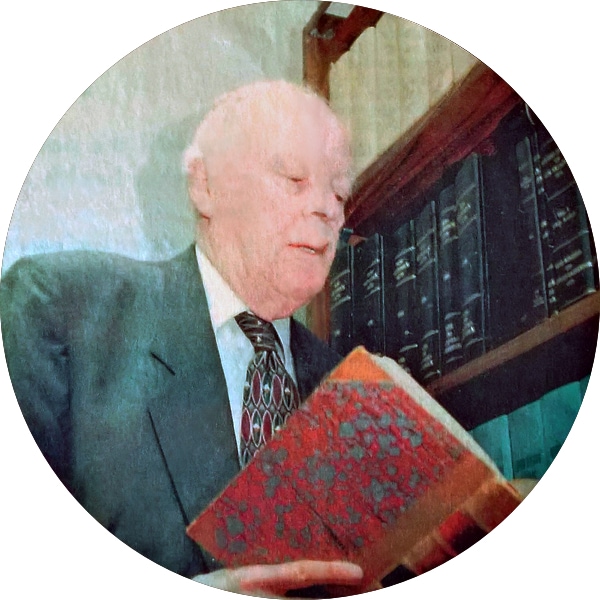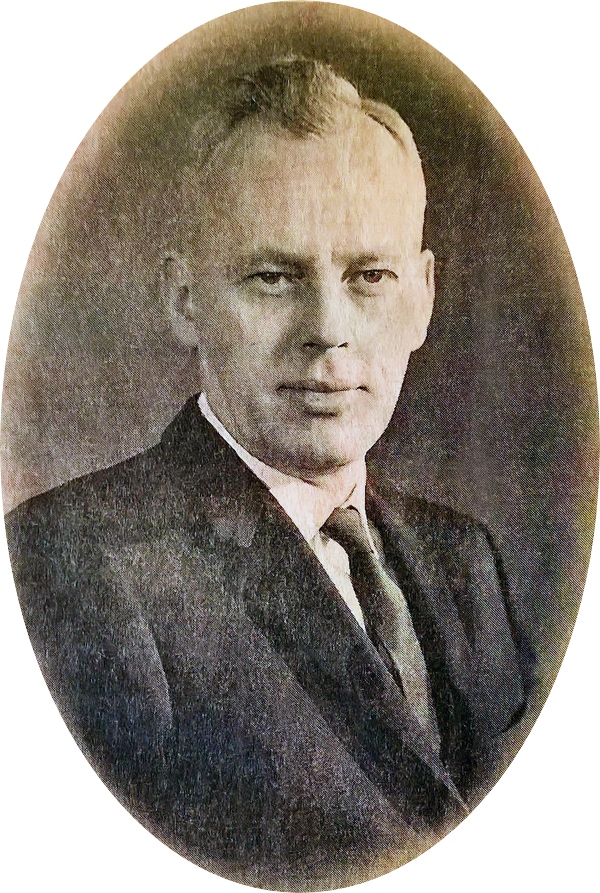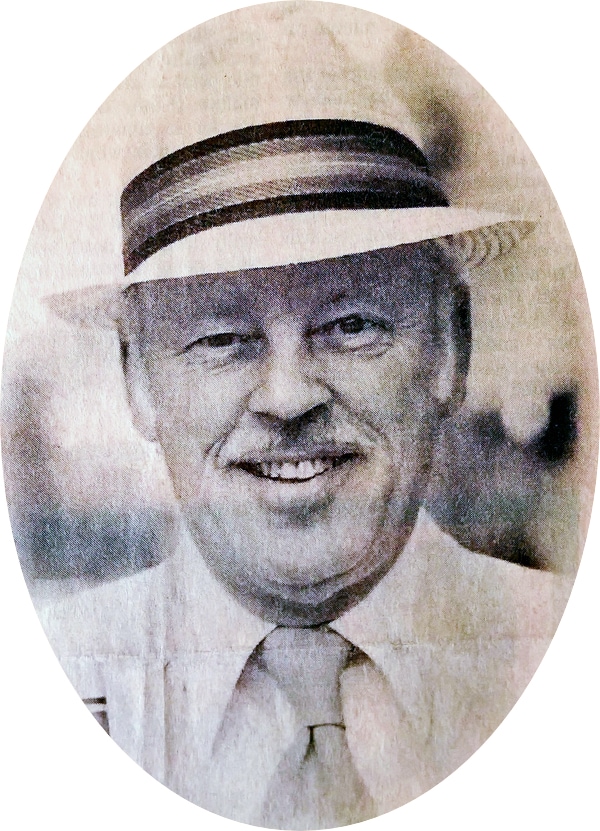By Richard Duplain

|
| 1997 |
The only judge appointed by former Prime Minister John G. Diefenbaker who is still active in the country will retire from the bench Friday, May 30.
Court of Queen’s Bench Justice William L.M. Creaghan turns 75 on that date. He is the only former member of parliament who was appointed by the federal government to a court in New Brunswick. Appointed at age 40, he served 35 years on the bench.
A holder of the Canadian Forces Decoration, Justice Creaghan served in the Second World War as a captain in the Royal Canadian Artillery. He served in Europe and the Mediterranean.
He attended Harkins Academy in Newcastle, N.B., where he lived with his parents Alice D. (Marven) and John Adams Creaghan until the family moved to Moncton. He graduated from Moncton High School in 1939, attended St. Francis Xavier University and Dalhousie University, from where he obtained his law degree in 1948.
In 1950 he married Thérèse (LeBlanc) and they had three children: Lawrence, in Montreal; Andrew, in Edmonton; and Valerie in Ottawa. Judge Creaghan practiced with his father.
He was called to the bar of New Brunswick in 1948, registrar of probate for Westmorland County from 1952 to 1958; alderman at large for Moncton from 1952 to 1958; elected to the House of Commons for Westmorland County in 1958 and appointed to the County Court in 1962.
In 1979 the county courts and the supreme court of New Brunswick merged, and he became a justice of the Court of Queen’s Bench. On May 30, 1987 he assumed supernumerary status yet maintained an office and full-time duties at the Justice Building on Queen Street.
***
Justice Creaghan enlisted in the Canadian Armed Forces in December 1941. “I was 19 and attending St. Francis Xavier University. I remember enlisting on the day Pearl Harbor was attacked. Two or three of us went to Halifax and I joined the armed forces.”
Justice Creaghan was with the Royal Canadian Artillery in Sicily, part of the reinforcements for Montgomery’s 8th British Army.
He returned home from the war in August 1945 and was stationed at Debert, N.S. pending deployment to the Pacific. He said that deployment did not occur, so he decided to attend law school. After graduation he practiced with his father in Moncton. Justice Creaghan was a partner in the firm until he became a judge.
“I became involved in politics in 1952 after practicing law for four years. I ran for city council in Moncton and was elected alderman. I was mainly concerned with the finance and police committees during the six years on council. Then in 1958 I was elected to the House of Commons to represent what was a strong Liberal riding.”
It was his second attempt at federal politics. “I ran in 1957 and lost.” His successful second attempt saw him in Ottawa for four years. In 1962 he was defeated by then-mayor Sherwood Rideout. Then he was appointed to the County Court for Northumberland, Gloucester and Restigouche and he moved back to Newcastle.
“In 1968 I was appointed to the County Court for York, Sunbury and Queens counties and I came to Fredericton.
“At that time, former Chief Justice Charles Hughes was the county court judge and he was being elevated to the Court of Appeal. That created a vacancy here and Federal Justice Minister John Turner called me to ask whether I’d take the position.”
In 1979 the County Court and the New Brunswick Supreme Court merged and became the Court of Queen’s Bench with a trial and family division. Similar mergers occurred across Canada and New Brunswick was among the first to embrace the concept.
“The merger was great for rural New Brunswick. Now, every month, the Court of Queen’s Bench opens in each district and judges live in those districts.
Justice Creaghan noted the Court of Queen’s Bench opens monthly in each of the eight judicial districts and that’s important to someone who is behind bars waiting for a trial.
Over the years, Justice Creaghan has been involved in a number of committees and boards. For 20 years he has been chairman of the Advisory Committee to the Minister of Justice for Legal Aid. He said the committee would make annual reports on the operation of the legal aid system and report to the Minister of Justice.
Judge Creaghan has also been a chairman of the Mental Health Review Board in Saint John. The board heard release applications from involuntary patients in provincial care institutions.
In 1992 he was co-chair with retired Justice Bernard Jean of the Electoral Boundaries Commission.
“I very much enjoyed that work. We travelled the province, holding public meetings in most municipalities.”
He said from that point on, the province ceased relying on counties for electoral boundaries. “Changing from counties to electoral districts was a major undertaking. Electors were possessive of their representatives. Some were reluctant to change.”
The October 1993 report resulted in the re-drawing of the provincial electoral districts giving Fredericton three ridings, one more than it had before and two less than it wanted. “We recommended 55 ridings, three less than previously with name changes for most of them,” he said.
Justice Creaghan wrote a dissenting chapter in the report. He made some criticisms and offered suggestions. His recommendations were accepted by the government.
“I criticized some of the changes and offered some additional changes. All my suggestions were accepted by the government in its new Elections Act.

|
| 1958 |
Presided Over Longest Trial In N.B. History
Eighteen years ago, almost to the day, Court of Queen’s Bench Justice W.L.M. Creaghan made closing remarks in the province’s longest jury trial – the Land Fraud Case.
The Fredericton Playhouse was rented by the province for the jury selection process involving 700 men and women.
The five-month trial involved five defendants and more than 30 fraud related charges. By the time the trial ended in June 1979, a jury of 11 decided none were guilty.
The trial went from February to June 1979. Justice Creaghan’s historic address to the jury lasted two days and then the jurors were sequestered for a week.
“I always agree with the jury,” said Justice Creaghan. In this trial, he said, the jury was very attentive.
A young lawyer just beginning her career in criminal law remembers the trial as her first court experience.
“I was fortunate that my first court experience was before Justice Creaghan,” said Provincial Crown prosecutor Mary Beth Beaton.
“And what a case it was.”
The prosecutors had to sift through the complex evidence in the Nova Scotia Savings and Loan mortgage fraud case.
“Never before or since has a jury been empanelled in the Playhouse. There were five defendants, so the jury panel was enormous. And there was Justice Creaghan seated at the centre of the stage conducting this unusual jury selection with ease and dignity.
Ms. Beaton said Justice Creaghan was consistently patient throughout the tedious days and months which saw 1,001 documents entered as exhibits.
“He was courteous to counsel and the witnesses and particularly concerned about the needs of the jury who were placed in a difficult position being away from work and family and then sequestered,” she said.
But as long and as gruelling a trial as it was, Justice Creaghan never lost his sense of humour, she remembered. At one point he recessed the trial to compose himself following a witness’s comical account of personal misfortune.
“There was one particular witness who was a property owner. He was recounting a long litany of bad luck that had befallen him around the time of his real estate transaction with the defendants,” said Ms. Beaton.
“The witness was matter-of-fact and laid-back in his discussion of his own misfortune. The he began discussing the Ground Hog Day gale that ripped the roof off his home. At that point we all, including Justice Creaghan, had tears streaming down our faces. The witness’s dry humour broke the tension and I particularly remember Justice Creaghan and the witness laughing so hard that Justice Creaghan called a recess to compose himself.
As the conclusion of the trial, Justice Creaghan asked the jury to consider the numerous victims. “In this instance, there is a long list of victims and harm inflicted to them,” he said.
“Think of the present accused on trial all these months, previously present in court throughout a lengthy preliminary inquiry,” he instructed.
“I want to tell you,” he told the jury in the final moments of his instructions to them on his 57th birthday, “I have great respect for our system of justice and great confidence in a trial by judge and jury.”
Justice Creaghan was exemplary is his objectivity, calm demeanor, and human compassion. “Out of court he has been equally admirable, always friendly and approachable,” said Ms. Beaton.
“I think of him as being warm and comfortable to talk to and curious about everything. I remember seeing him one day walking into the furnace room at the Justice Building on Queen Street. He was with a maintenance man and wanted to see how the system worked,” she said.
“He’s an all round nice person and a tribute to his office,” said Ms. Beaton.
‘He’s A Gentleman And A Scholar’
“Most people who left his court departed knowing they had a full hearing and a fair trial and that’s the most that can be said about a judge,” said Court of Appeal Justice Patrick A.A. Ryan of retiring Justice William L.M. Creaghan.
“He was extremely considerate of the families of victims and the future prospects of rehabilitation of offenders who came before him,” noted Justice Ryan. "Anything he handled, it was handled competently, and his decisions were rarely appealed.”
Justice Ryan first met Justice Creaghan when he was a county court judge.
“Judge Creaghan is respected by government. He has been placed in positions and has taken on various tasks. He has so much experience in politics, commerce and the judiciary that his opinions are valuable,” remarked Justice Ryan.

|
| 1986 |
***
Another former member of parliament under John G. Diefenbaker recalls Justice Creaghan as a hardworking and dedicated representative of his constituents.
Chester MacRae, 84, vividly remembers Justice Creaghan as an intelligent member of parliament. “He was a great MP. He did his job well and he’s a very fine man,” said the former teacher and Fredericton Business School owner.
“He’s a gentleman and a scholar,” said Mr. MacRae. “And he’s a natural for the bench.”
Mr. MacRae said that as an MP, Justice Creaghan was an honorable parliamentarian. He was never belligerent to people.
The former backbencher and decorated Second World War veteran remembers his six electoral victories between 1957 and 1972. He chides Justice Creaghan who won one election.
***
Former Crown prosecutor John Beaton remembers meeting Justice Creaghan in 1972. “Our offices were located in the York County Court House. Justice Creaghan was then a judge of the County Court with an office directly across the hall from me.
“It didn’t take long to come to know him,” said Mr. Beaton. “He is that type of person – outgoing, friendly, pleasant and always approachable. He’s a gentleman and a gentle man.
“Even when he would rule against the argument I presented, I would leave the courtroom secure in the fact and feeling that I had had a fair hearing by a judge who was familiar with the facts of the case and the law.
“He would sometimes say, ‘if you disagree there are those fellows upstairs who might disagree with me,’ referring to the court of appeal.”
Mr. Beaton even got a lesson in ethics and the public’s perception of lawyers, from Justice Creaghan.
“I was prosecuting a jury case in Newcastle in 1973 which by necessity involved staying at a local motel. On the second day of trial I had gone to breakfast in the motel dining room and there was Justice Creaghan sitting by himself.
“I took it upon myself to join him for breakfast. His response was to the effect that we should not be seen socializing together unless the defending lawyer was present and reasoned the appearance might convey the wrong impression in the context of the public’s perception of fair play.”
Mr. Beaton said Justice Creaghan was always approachable and always had a sense of humor.
***
“He has done a great service to the people of New Brunswick in his capacity of judge,” noted Appeal Court Registrar Alexander DiGiacinto.
“He has been a gentleman to work with. He is a down-to-earth person with an ability to deal with people,” said Mr. DiGiacinto.
“Over the years he has been very obliging by making himself available to those in the legal profession.”



